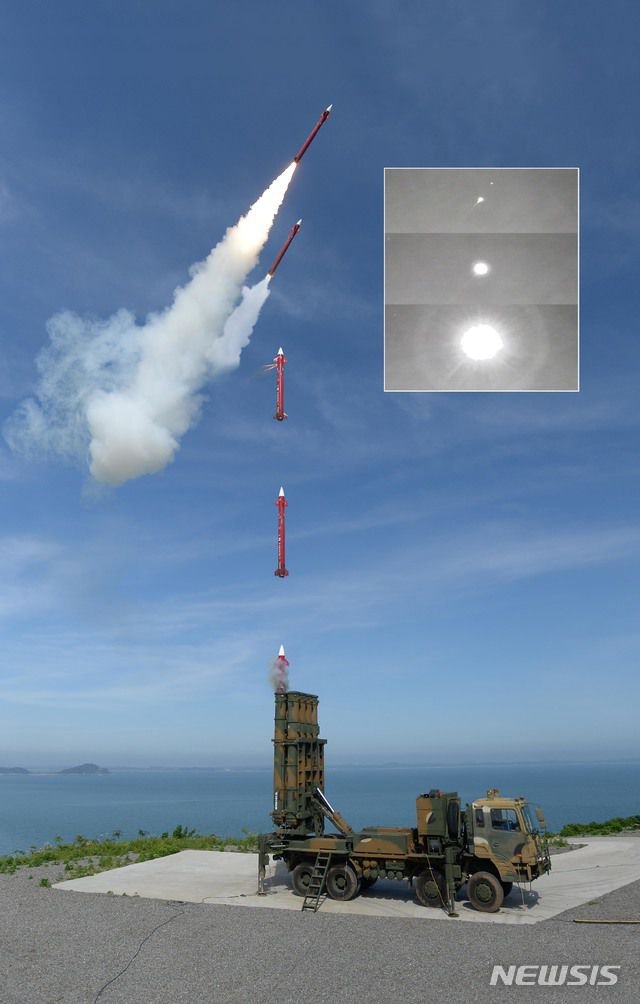The UAE and South Korea have inked a preliminary agreement for the acquisition of the latter’s Cheongung II surface-to-air missile systems. The deal was signed a day before Yemen’s Houthi rebels launched a deadly attack at an oil storage facility near Abu Dhabi airport, killing three people.
The UAE has been in talks with South Korea for acquiring its missile defense systems for a while now. In November last year, the defense ministry of the Gulf country had announced its plan via Twitter to buy the Korean air defense system as a step towards strengthening defense cooperation.
In the past few months, the UAE has concluded several defense deals. It signed an agreement with France to acquire 80 Rafales, canceling its plans to buy F-35 stealth fighter jets owing to American dilly-dallying and inked a contract with Israel’s Elbit Systems to procure electronic warfare systems.
And now, Abu Dhabi has firmed up plans to buy the Korean-made Cheongung II, a mid-range surface-to-air missile.

South Korean President Moon Jae-in met with UAE Prime Minister Sheikh Mohammed bin Rashid Al Maktoum in Dubai on January 16 and signed the agreement, according to reports. The estimated value of the deal is $3.5 billion.
The Korean Defense Acquisition Program Administration had earlier confirmed that negotiations had begun in November when the UAE first tweeted about the South Korean air defense systems.
Seoul had then stated that if signed, the missile contract will be South Korea’s largest weapons sale in its history.
The South Korean companies Hanwha Defense and Hanwha Systems and LIG Nex1 signed a final joint contract for the supply to the United United Arab Emirates of a large batch of new South Korean medium-range anti-aircraft missile systems Cheongung II.
https://t.co/7WvnlSPgpD pic.twitter.com/ZhFoBhcRur— Tango III's Military News (@IiiTango) January 14, 2022
The deal assumes significance in the wake of the January 17 attack. According to reports, the Iran-backed Houthi group had launched the attack on the UAE using missiles and drones.
The UAE along with Saudi Arabia supports the government in Yemen that is fighting the Houthi rebels. Since March 2015, the UAE has somehow escaped the Houthi rebels’ attention, despite being a member of the Saudi-led coalition battling the Houthis and ostensibly supporting Yemen’s government.
Saudi Arabia has been the target of Houthi-claimed missile and drone assaults. The last time the UAE was attacked was in 2018, according to Al Jazeera.
The acquisition of the air defense system becomes even more important in the backdrop of these attacks. Since there is no end in sight to the protracted Yemeni conflict, the best bet for the UAE and for Saudi Arabia could be strengthening their air defense and interception systems.
However, it is another matter that the coalition has been regularly conducting airstrikes in Yemen and has been accused of grave human rights violations in the war-torn country.
How Will Cheongung II Defend UAE?
The Cheongung II M-SAM system is a key component of South Korea’s multi-layered anti-missile defense system. The missile, which uses “hit-to-kill” technology, is meant to intercept hostile missiles approaching from below 40 kilometers.
The Cheongung II is primarily used to intercept hostile missiles. It has a length of 4 meters and a weight of 400 kg. It differs from the Cheongung I in that it has a ballistic missile intercept function, making it even more capable and versatile.
Developed by South Korean defense company LIG Nex1, the missile system entered mass production in 2018. It was delivered to the Korean military in November last year.
The hit ratio of a missile intercept system is the most essential factor. The Cheongung is said to have a perfect strike rate. The missile’s top speed is Mach 5, which enables it to intercept enemy missiles falling at a rate of 5 kilometers per second.
Each battery consists of four launchers that can each carry eight interceptor missiles, as well as multifunction radar and a command post vehicle. The system will be designed in accordance with the UAE Air Force and Air Defense’s operational requirements.
The advanced capability of this system to intercept and hit missiles is expected to be an asset for the UAE, which faces threat from Iran and its proxies in the region.
- Contact the author at sakshi.tiwari9555@gmail.com
- Follow EurAsian Times on Google News